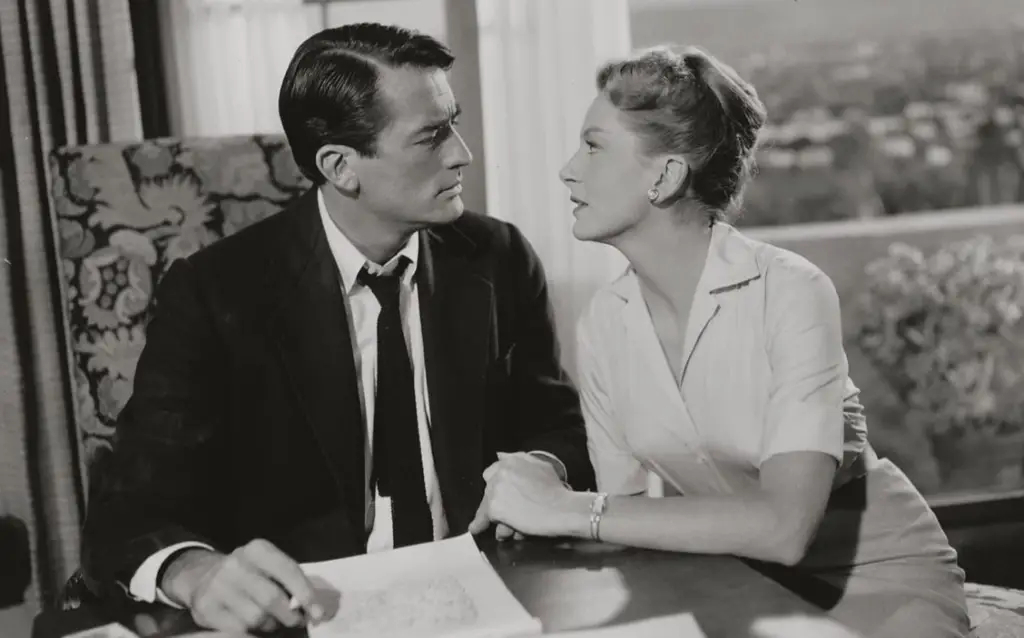Art is an important form of self-expression, and filmmaking is an enchanting, provoking, and at times, downright lovely expression of that. So here’s where we say ‘thank you’ and show some love. Welcome to The Toast, a bi-monthly series dedicated to Hollywood’s greatest acting legends. An ode to the finest. Get a glimpse into their off-screen life and their on-screen magic. Vintage Hollywood and millennial stars! We’ll celebrate both. So let’s raise our glass, and down some bubbly.
Swaying gently to the music on the moonlit patio, enveloped in silky 1950s Cinemascope color, he held her close. “You have a lovely sensitive face,” he told her. Though they had only just met, she was falling in love with him. Later, he gazed into her pretty blue eyes – his intentions as clear and as dazzlingly uplifting as that blue. “Have dinner with me,” he said, “I don’t want to lose you.” Gazing back softly, she replied, “When?” Her heart was pounding. Lit from the inside out, she saw her future in his kind, dark, handsome face. He was strong, safe, secure.
And that’s how we always felt watching actor Gregory Peck. He took us into his world, commanded respect, and had all of us eager movie watchers feeling ‘oh so good.’ That was him playing brilliant, but troubled novelist F. Scott Fitzgerald in 1959’s Beloved Infidel. Even when playing a disturbed alcoholic beleaguered by anger issues (as his new love interest, entertainment columnist Sheilah Graham, would unfortunately later find out), we somehow felt safer seeing this character through Gregory Peck. He made a movie better, no matter the role or genre.
Today, Gregory Peck would have been 105. It’s hard to imagine him not here with us. Passing away in 2003, at 87, he left behind a vast, eclectic filmography still cherished today. He won an Academy Award for 1962’s To Kill a Mockingbird, and starred in tearjerker family favorite, The Yearling (1947). He was an A-list actor who doubled as glittery Hollywood movie star. Quality? Gregory Peck embodied it.
A Prolific Career
In Hollywood “action” from World War II to the Millennium (1940s to 1990s), he graced the dusty silver screen in black and white classics like Alfred Hitchcock’s Spellbound (1945). He then exploded in colorful Technicolor with films like 1969’s Mackenna’s Gold, a visually dazzling Western adventure co-starring legendary Omar Sharif. This movie is a literal cliffhanger!
He even starred alongside newcomer actress Audrey Hepburn in 1953’s Roman Holiday, a vehicle that earned her the Best Actress Oscar, catapulting her to instant fame. Even better, Peck predicted Hepburn’s fame and helped her get there. While filming with her through the charmingly chaotic, scooter-filled streets of Rome, Italy, cinematic legend has it that he knew his beautiful partner would be a star. And he graciously aimed to assist.
Channeling that forever sought-after ‘on-screen romantic chemistry,’ he allowed Audrey Hepburn to shine in Roman Holiday. A true gentleman. He played a perfect journalist Joe Bradley to Hepburn’s Princess Ann. Their on-screen chemistry was delightful – no small feat. He could have easily absorbed the camera, asserting his own already-established star power, but no, not Peck’s style. Quite remarkable. He was all about creating quality.
Born in the southern California seaside of La Jolla, California, on April 5th, 1916, Gregory Peck had Hollywood to the north, and Tijuana, Mexico, to the south. Back then, Hollywood was merely a dusty, dry, hilly outpost, where celluloid had dropped anchor just a few years prior around 1910, creating the first major film studio. Food for the imagination. Horse-and-buggy times? Not quite. But certainly not airplane-friendly. No LAX (Los Angeles International Airport) just yet.
Beloved Infidel
It almost seemed destined then that young Gregory Peck would find his way north to the ever-growing bright lights of Hollywood, where he would hone his artistic skills and test his artistic might – making his film debut in 1944’s Days of Glory. He was not unlike one of his characters in one of his lesser-known films. Cue that romantic Beloved Infidel again.
An obscure gem starring two actors in their prime (Gregory Peck and Deborah Kerr), this film chronicles the doomed love affair between real-life 1930s writers F. Scott Fitzgerald and Sheilah Graham. An improbable love affair. A gut-wrenching finale. Peck is legendary American novelist F. Scott Fitzgerald (author of ‘The Great Gatsby’) who unfortunately finds himself a washed-up alcoholic who moves to Hollywood, hoping to earn a living as a screenwriter to support his daughter and mentally ill wife. Tough stuff.
Then Deborah Kerr is light and bright Hollywood gossip columnist Sheilah Graham (but with a surprisingly dark, sad past), who falls Hollywood ‘head over heels’ for the genius writer. But she soon learns of F. Scott Fitzgerald’s alcoholism – a disease which also leads him to verbally and physically abuse her. Worse still, after eventually beating his inner demon of alcoholism (in large part due to Sheilah Graham’s love and assistance), he passes away from a heart attack in her home, just before Christmas. There’s even a sweet Christmas tree decorated all red and festive in their living room. How tragic.
Mid-Century Magic
Now some old movies like Casablanca (1942) and Rebel Without a Cause (1955) are timeless. Even in 2021, people hear the movie title, and instantly know who’s in the film, and what it’s about. But Beloved Infidel isn’t one of those films. What’s so great about it then? And why highlight it in a Gregory Peck tribute? Released at the tail end of those conservative, proper 1950s, it’s a movie that under-performed at the box office, and was quickly forgotten. Even today, it’s hard to locate a “cult” Blu-ray or Netflix following for it.
But that’s precisely what makes Beloved Infidel so special. It’s a movie that hasn’t transcended its time. It has its feet firmly planted in those conservative, proper 1950s – and it’s a magical place to be. Cinemascope filmmaking was popular back then, which gives this film a grand, panoramic, and smooth visual appeal.
Match that with the film’s grand, plaintively heart-swelling theme song (appropriately called Beloved Infidel), and this movie is an aesthetic treasure for any 1950s cinema fan.
Beloved Infidel is like a good old-fashioned Frank Sinatra or Vic Damone nightclub croon-along – complete with a US$3 vodka tonic drink (which would likely cost an expensive US$20 in the year 2021). The film has a charmingly “proper” 1950s stylized quality.
And as for Peck and Kerr’s contribution? They are stellar. Peck and Kerr toe the line exceeding well in portraying a love affair that commences with utter sweetness, but devolves into utter violence and tragedy. It’s a tough fence to straddle. How does one portray a romance that is truly sweet, but not too sweet that it becomes eye-rolling or nauseating to watch? Peck and Kerr accomplish this.
Peck and Kerr Shine
There are so many tender kisses and cuddles at the outset of this romance that the viewer easily (downright gladly) gets swept away by these two lovebirds – as they take their love poolside, beachside, and even to vibrant Mexico. We might even be thinking, “What’s this movie about anyway? Is it a straight-up biopic about these two famous writers? Or instead a straight-up romance? But every film must have a conflict. Where’s the conflict here?”
That’s when Beloved Infidel brilliantly strikes. And the viewer is left in complete understanding that, in order to feel the full pain of this romance’s tragedy at its ending, the viewer must first understand the pure beauty at its beginning. A bit of armchair psychoanalysis ‘cinema-style?’ Definitely. Director Henry King does very well with this psychological build-up.
King, Peck, and Kerr are also especially potent in the dangerous face-slap and gun scene. This sequence is filmed like a play, without many cuts or camera shifts, and instead relies almost exclusively on its actors to bring the drama. That they do. Peck and Kerr are absolutely riveting, pulse-pounding. Their excellent acting skills are on full display.
Beloved Infidel isn’t a perfect film. There are questions as to the timeline and how many weeks, months, or years we’re observing of this couple’s relationship. Some of the character development also feels lacking and disjointed. Still, for so many ‘niche’ movie audiences, like diehard romance fans, biopic aficionados, classic movie lovers, and importantly, Gregory Peck lovers – Beloved Infidel is a beautiful film.
Peck’s Star Power
It’s everything we’d want a 1950s romance movie starring Gregory Peck to be, right down to Peck’s ability to bring depth, conviction, and sincerity to a highly complicated character who’s based on an iconic, deceased writer. It’s a tall order. And Peck delivers. He takes us on a rollercoaster ride of virtue vs. vice, and his star power radiates – even in this tiny cinematic treasure.
Happy Birthday to Gregory Peck. He was a powerhouse acting talent who embodied ‘movie star’ in such an admirably calm, generous, and easy way. He had an awe-inspiring acting range, and through his many movies took us on moral adventures, action adventures, and even to Rome, Italy, with sprightly Audrey Hepburn. Ciao from Italia! Whether playing beyond upstanding, honorable lawyer Atticus Finch in To Kill a Mockingbird (1962), or portraying complex writer F. Scott Fitzgerald in Beloved Infidel, Gregory Peck always held us close in his warm embrace. He always had us feeling like we were ‘right there’ with him.
And earning a coveted AFI (American Film Institute) ranking? Sure, he did that, too. Peck is ranked an impressive #12. According to the AFI who compiled the list in 1999, Gregory Peck is the 12th all-time ‘greatest American screen legend.’ Amazing.
Thank you, Gregory Peck, for all you gave.
In the run up to the Oscars, next up in our series is an actor who’s a league of her own, with a record 21 Academy Award nominations and 32 Golden Globe nominations. No point for guessing! Sign up to our newsletter to read the next story in our The Toast series.





Very informative article regarding a true legend!
Get out the popcorn popper. Gregory Peck and Deborah Kerr create cinematic sparks. Thank you Joslyn for this tasty treat.
Such an enjoyable article. Has now made me a flickside junkie 🎉